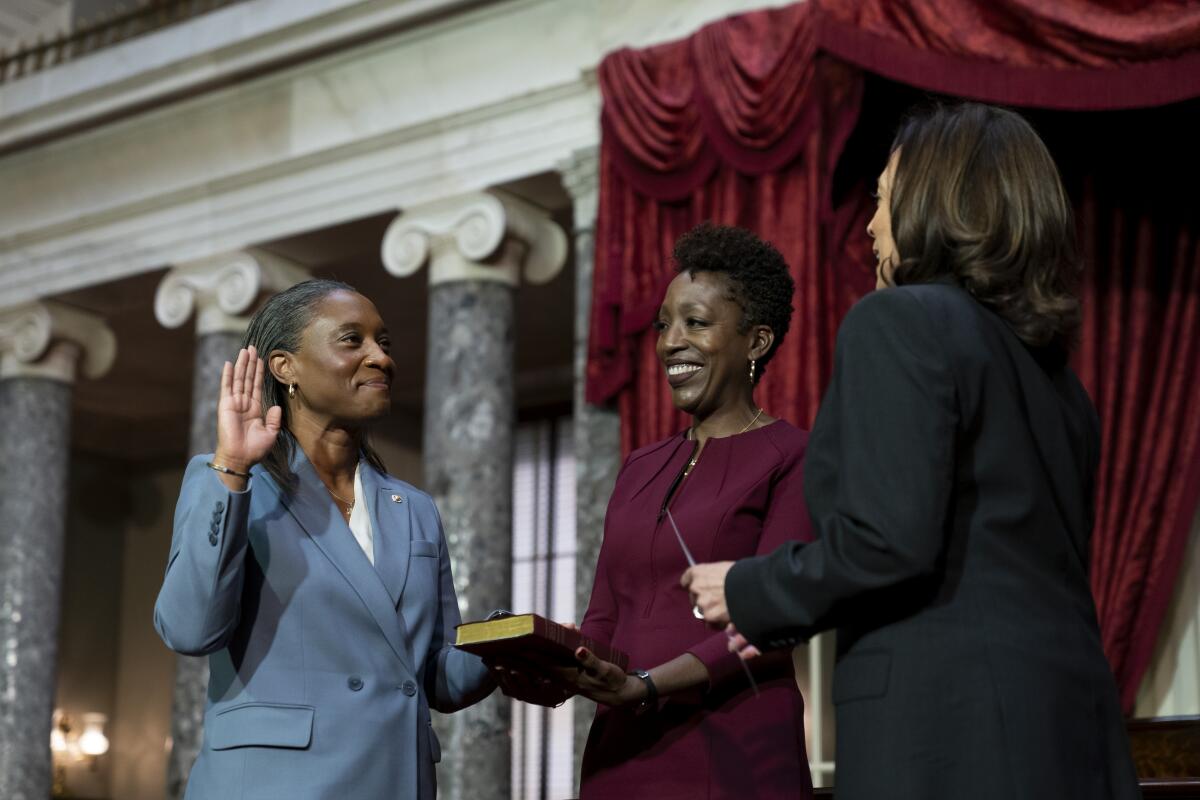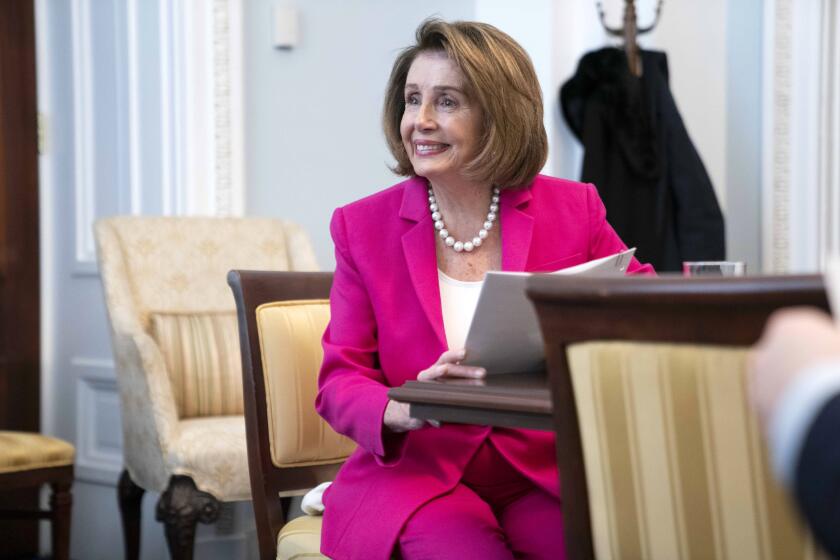News Analysis: California knows earthquakes. This week, a temblor reshaped the state’s politics

- Share via
WASHINGTON — At 3:04 p.m. Tuesday, Laphonza Butler walked across the floor of the U.S. Senate, stood facing Vice President Kamala Harris and took the oath to defend the Constitution, making official her emergence as a powerful new figure in California’s leadership.
At the same moment, on the other side of the Capitol, the fate of a long-tenured figure in the state’s power structure stood in the balance, as members debated Speaker Kevin McCarthy’s effort to keep his post.
McCarthy’s longtime antagonist, former Speaker Nancy Pelosi, missed the debate and the vote, which McCarthy lost. She was in San Francisco, “grieving the loss of her dear friend Dianne Feinstein,” her spokesperson said. “She is very saddened not to be there for this historic vote.”
The landscape of California evolves through earthquakes. Sometimes its politics does as well.
The confluence of events over the last week — Feinstein’s death early Friday morning, Gov. Gavin Newsom’s surprise choice of Butler to replace her and the hard-right revolt against McCarthy — combined to create a temblor that has reshaped both sides of the state’s political divide.
“There have been more eventful weeks in the country.... But politically? I don’t think so,” said former California GOP Chairman James Brulte, whose work in the state’s politics dates to the 1970s.
“A U.S. senator died. You have a governor getting to make what has to be almost an historic appointment, and now McCarthy,” he said. “I just don’t ever remember anything like that.”
Laphonza Butler, Gov. Gavin Newsom’s appointee to the U.S. Senate, says she wants to carry the baton of Sen. Dianne Feinstein.
For years, California government seemed locked in place, with an aging set of leaders, nearly all of them white, clinging to power over a young and increasingly diverse state. The logjam at the top began to break five years ago when Gov. Jerry Brown finished his fourth term as governor. This week, it burst wide, completing a generational shift in a sudden, unforeseen rush.
A slip of the tongue highlighted how the events had caught the state’s public figures by surprise: Harris, formally introducing Butler to the Senate as the appointee for Feinstein’s “unexpired term,” instead said “unexpected.”
“Unexpired and unexpected,” she added, catching herself.
On the Democratic side, four people “dominated California politics for the last 50 years,” said former State Controller Steve Westly, pointing to former Assembly Speaker Willie Brown, Gov. Brown, Feinstein and Pelosi.
Of that group, “Nancy Pelosi is the only other major figure that’s still active,” he said.
“That is a huge changing of the guard,” he added.
In an interview with The Times, former House Speaker Nancy Pelosi says she’s ‘liberated,’ ‘free at last’ and writing a book.
On the Republican side, McCarthy has been “the most important figure in California for two decades,” said Republican strategist Rob Stutzman.
“There is a generational change” in the state’s politics, said Sara Sadhwani, a professor of politics at Pomona College. “I think Laphonza Butler reflects that kind of change,” she added, pointing as well to recently elected Latino and Asian Republicans. “It’s refreshing to have a new face in California politics.”
A few hours after the House voted, 216 to 210, to declare the speakership vacant, with eight Republicans deserting McCarthy, the longtime congressman from Bakersfield announced he would not seek reelection to the speaker’s office. House GOP leaders plan to hold an election next week, although whether anyone can unite the deeply divided Republican conference remains unclear. McCarthy’s election in January came only after 15 rounds of balloting.
Until someone else does gain a majority, McCarthy’s ally, Rep. Patrick T. McHenry of North Carolina, will serve as speaker pro tempore.
For California’s embattled Republican minority, losing McCarthy as speaker would be devastating, said Stutzman.
“The party in California has been shrinking” for years, but “it would be far worse without the leadership he’s exercised,” Stutzman said.
McCarthy, a prolific fundraiser and an effective recruiter of candidates, has kept Republicans competitive in a half-dozen swing seats in California — winning enough to give the party its House majority after the 2022 midterm elections.
He also protected less conservative Republicans in the state from potential challenges, at one point in 2022 flying to Mar-a-Lago to ensure that former President Trump would not attack Rep. David Valadao of Hanford, who had voted the year before in favor of Trump’s impeachment.
McCarthy “kept the crazies from gaining even more control,” Stutzman said. “I don’t think it’s commonly appreciated how much worse it could be.”
Fellow Californians were prominent among the GOP members who unsuccessfully defended McCarthy in Tuesday’s floor debate.
“If this motion carries, the House will be paralyzed,” said Rep. Tom McClintock of Elk Grove. “The Democrats will revel in Republican dysfunction and the public will be rightly repulsed.”
For the state as a whole, the loss of both Feinstein and McCarthy would mean a sudden, huge reduction in the political clout that comes with long seniority.
Democrats downplayed that impact. They united against McCarthy in Tuesday’s vote, calling him untrustworthy and unprincipled.
Asked about the potential loss of clout, Rep. Ro Khanna (D-Fremont) replied: “I’m not aware of what benefits California has gotten out of McCarthy’s speakership.”
If Democrats retake control of the House in 2024, the state would regain a spot in the House’s senior leadership, with Rep. Pete Aguilar of Redlands, now the third-ranking Democrat in the House.
By contrast with McCarthy, Feinstein was less partisan. California political figures on both sides of the aisle said she would be hard to replace.
“She was a deal maker” in a state where deals are often hard to broker, Stutzman said. Even as age weakened her in recent years, Feinstein was able to use her seniority to steer billions in federal funds to California for projects across the state, including desert preservation in the Mojave and Metro’s Purple Line to the Westside.
Butler, in an interview with The Times the day before her swearing-in, said she had “adored” her predecessor.
But even as she did so, she tacitly acknowledged the generational shift many in her party had long advocated.
“We have a country where many people across the state of California feel like they may not be being listened to,” she said. “I want to take this opportunity to show up for the people of California to hear their concerns and to act in a way that is consistent with their values.”
Lauter reported from Washington and Oreskes from Los Angeles. Times staff writer Erin B. Logan and special correspondent Cameron Joseph in Washington and staff writers Seema Mehta in Denver, Taryn Luna in Sacramento and Faith E. Pinho in Los Angeles contributed to this report.
More to Read
Get the L.A. Times Politics newsletter
Deeply reported insights into legislation, politics and policy from Sacramento, Washington and beyond. In your inbox twice per week.
You may occasionally receive promotional content from the Los Angeles Times.














